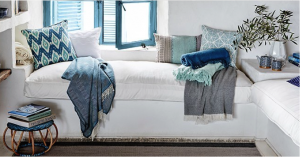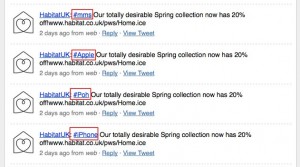How should home furnishing companies use Social Media?
Following on from my previous blog post, where I discussed the HOT benefits of social media, I’m now going to directly relate it to the home furnishings market.
The UK home furnishings market is positioned as part of the home furniture industry. This contributes a whopping £9.4bn to annual GDP, a figure that took me by surprise due to its sheer size. Industry revenue is projected to grow by 4.9%, which didn’t take me so much by surprise considering that the Government’s Help to Buy scheme is estimated to help 120,000 households, increasing the number of first time buyers, having a positive trend on the UK home furnishings market. Surely you’re now thinking how can social media increase this statistic even more? So now lets look at the social media industry and see how the two combined, can benefit from one another..

Since the millennium, user generated content has turned the world upside down, becoming increasingly popular on the web. An important thing to remember is more and more users are participating in content creation, instead of just consumption (Agichtein et al, 2008). Without overwhelming you with numerous statistics, here are just a few to get your head around; Twitter has become the most popular micro blogging site (Zarrella, D. 2010) with an expanse of over 230 million active users (an opportunity not to be missed by home furnishing retailers), Facebook has become the foremost site, allowing companies to track and engage with potential customers (Zarrella, D. 2010) with over 1.2billion users. Its apparent to see that social media is an effective way of communicating for retailers (Chaffey and Ellis-Chadwick, 2012) – surely?!
![]()
Put both these industries together and you cant deny the ever-growing importance of social media as consumers go-to tool for inspiration, reviews, communication and shopping.
I’ve found this great case study on Fab Furnish as a great example of a success story.

In order to utilise and leverage social media, it is important to set some business objectives, for Fab Furnish they wanted to:
- Increase website traffic
- Increase sales by 20% every month using their Facebook Ads
So how did they go about it? If you want to read in more detail then check out this blog on Digital Vidya!
Strategies implemented to attain their objectives:
- Photo Ads
Fab Furnish posted relevant and attractive photographs showcasing the best of their 60,000 products. These were shown on desktop and mobiles on the right side of the page, in the form of news feed, encouraging people to click on them.
- Link Ads
This increased traffic to the website providing quick and easy further details of the products.
- Quality Images
In-house top quality images were selected to be in the Ads alongside embedded call to action tab enabling visitors to take immediate action.
- Targeted Right People
Fab Furnish decided to target the upwardly mobile bracket with superior spending capabilities and those expressing an interest.
- Custom Audiences
The first line of target should be a customer that is loyal as they prove to be a valuable part of a business. Identifying requirements of those existing helps to market appropriately and effectively.
- Increased Online Sales
Don’t forget that it’s essential for potential customers who click through, are forced to visit again and again!
How to change your online presence:
- Setting up a page
This should include all the information about the business, its diverse range of products, not forgetting attractive images and links to interesting blogs and the website
At least one page category should be mentioned to appear in search results making it easily accessible.
- Identifying the target audience
For a home furnishings company, this needs to be people who are willing to spend on these products and those who have shown interest in products whilst visiting the website. This helps to target the right products to the right customer.
- Compelling Content
This has more of an impact than blocks of text, encouraging increased click through. Queries need to be responded promptly to help develop a bond to the brand. Links provided increase user friendliness and enables interaction for the customer.
What were the results for Fab Furnish?
- Revenues increased by 10 times
- Traffic to the website increased 5 times
- The number of orders increased by 12 times
- The ROI over advertisements increased by 2 times
WOW.. it’s now clear to see that home furnishing companies can leverage their online sales by implementing social media marketing strategy to attain objectives. These channels should be embraced and not ignored! I’ve definitely learnt more through this success story and I hope you have to!
Now take a look at this Whitepaper by Sabrina Testoni showing more opportunities for homeware retailers through Social Sharing!
However I’ve also found an example of a failed success story, looking at Habitat UK.
This trendy furniture store decided to use trending topics on Twitter to get their brand and products noticed. Habitat UK used hashtags that had nothing to do with furniture or shopping, using popular ones at the time such as #Apple, #iPhone, even using a hashtag for an Iranian election, trying to get people to sign up to a database… totally inappropriate I’m sure you’re all thinking!

As you would expect people were annoyed which led to Habitat deleting its offensive tweets replacing them many product and sales related tweets.
What could Habitat have done instead?
- Individually reply to everyone who complained and apologise for the spammy behaviour
- Apologise in public
- Given Twitter followers a special discount to be redeemed online
- Ask Twitter followers what information/offers they would like to see to build value and interest
It’s ok to fail, but do it quickly and apologise publicly! If you want to read more on this, take a look to Social Media Today’s blog!
So what’s the main message?
- Tone down the hard selling
- Respond quickly to customers
- Use lots of enticing videos and photos
- Be creative
- And perhaps.. unexpected!
So finally, I’d like to leave you with some academic DO’s & DON’Ts from Ramsay, (2010) to get you thinking from all perspectives…
DO put a communication strategy in place
DO develop a style
DO strike the right balance between conversation and sales
DO set limits for what is and is not to be tolerated in any channel
DON’T use social media for corporate communications
DON’T be afraid to vary strategy per channel
DON’T forget to update content
If you have the time I’d recommend looking at the social media etiquette specific to each channel here.
References:
Agichtein, E., Castillo, C., Donato, D., Gionis, A., & Mishne, G. (2008, February). Finding high-quality content in social media. In Proceedings of the 2008 International Conference on Web Search and Data Mining (pp. 183-194). ACM
Chaffey, D. and Ellis-Chadwick, F. (2012) Digital Marketing: Strategy, Implementation and Practice. Harlow: Financial Times Prentice Hall
Ramsay, M. (2010). Social media etiquette: A guide and checklist to the benefits and perils of social marketing. Journal of Database Marketing & Customer Strategy Management, 17(3), 257-261
Zarella, D. (2010). The Social Media Marketing Book. Canada: O’Reilly